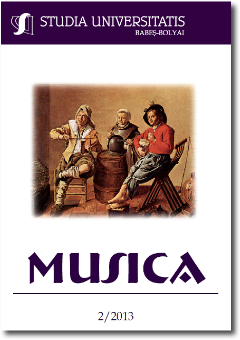“THE HUNGARIAN FOLK-SONG … ECHO OF THE ENTIRE HUNGARIAN SOUL” – THOUGHTS UPON A QUOTATION FROM ZOLTÁN KODÁLY
Keywords:
pentatonic, diatonic, folk-song, Hungarian, nations, ethnic groups, mentality, spiritualityAbstract
“... it is false method to start out from the diatonicism and then later turn back to the pentatony as if to an exceptional oddity.” Zoltán Kodály writes these lines in 1943, after he ascertains that pentatonic tunes constitute the Hungarians most ancient music. Thus the pentatonic scale is very important in Hungarian music in general. The pentatonic scale mirrors the Hungarian characteristic: the pentatony is that which receives into, and accepts. It is open to foreign elements (and the pien notes which are often very characteristic of the Hungarian pentatony, represent the foreign elements). It models that spirit, in which he lives his life in its entirety. However, that entirety is formed from many tiny little parts. Therefore it receives the foreign elements without changing its own pentatonic character. Nevertheless the diatonic scales are closed. In them, folk-songs only very rarely use the foreign notes in their system. They represent a spirit which takes itself out of unity, and in most cases it is unable to accept the strange difference, the mentality and the world view in which it finds itself quite foreign. The pentatonic scale is a separate system, independent of the heptatonic. There is no direct kinship between the pentatony and the diatonicism. In the same way as there is no kinship amongst the people who use these two different systems basically. The only people are the Hungarians who use both scales in an exceptional way.
References
Andrásfalvy Bertalan: A magyar nép magatartása éneklésben, táncban és a népszokásokban (The conduct of the Hungarian people in singing, dancing and folk customs). 1999,
Andrásfalvy Bertalan: A művelődéspolitika fő feladatai (The Main tasks of cultural politics), In: Magyar nemzetstratégia (Hungarian National Strategy), Magyar Konzervatív alapítvány, Püski, Budapest, 2008.
Árkay László: Monográfok no. 5. (Monographs no. 5.), Brockhaus – Riemann: Zenei Lexikon III. (The Encyclopedy of Music III.), Redacted by Carl Dahlhaus and Hans Heinrich Eggebrecht, The editor of the Hungarian issue: Antal Boronkay, Editio Musica, Budapest, 1985.
Kodály Zoltán: 333 Olvasógyakorlat. Bevezető a magyar népzenébe (333 Reading practice. Introduction to Hungarian folk music), Editio Musica, Budapest, 1943.
Kodály Zoltán: Néphagyomány és zenekultúra (Folk customs and musical culture), Selected, provided with foreword and footnotes Ádám Katona, Kriterion, Bucharest, 1974.
Kodály Zoltán: A magyar népzene (The Hungarian folk music), 8th edition, The collection of examples compiled by Lajos Vargyas, Editio Musica, Budapest, 1981.
Jagamas János – Faragó József: Romániai magyar népdalok (Hungarian folk-songs from Romania), Kriterion, Bucharest, 1974.
Lükő Gábor: A magyar lélek formái (The shapes of the Hungarian soul), Exodus, Budapest 1942.
Varga Csaba: A kőkor élő nyelve (The living language of the Stone Age), Ed. Fríg, Pilisszentiván, 2003.
Vargyas Lajos: A magyarság népzenéje (Hungarian Folk Music), Editio Musica, Budapest, 1981.
Záhonyi András: Ősi titkok nyomában (On the track of ancient secrets), Miskolci Bölcsész Egyesület, Miskolc, 2005.
http://www.folkradio.hu/folkszemle/andrasfalvy_amagyarnepmagatartasa/index.php#_ftnref1 (looked up on 7th December 2013).
http://www.magtudin.org/Arkay%20Laszlo.htm (looked up on 7th December 2013).
Downloads
Published
How to Cite
Issue
Section
License
Copyright (c) 2013 Studia Universitatis Babeș-Bolyai Musica

This work is licensed under a Creative Commons Attribution-NonCommercial-NoDerivatives 4.0 International License.



